Hello,
Haruki
Interview with Haruki Murakami
- Photography by Taro Hirano
- Illustration by Hattaro Shinano
- Text by Keisuke Kagiwada
Murakami comments on his choice of clothing. “I try to wear plain clothes, the simpler the better. Jeans and a T-shirt, with a sweatshirt or sweater. Since I don’t need to show up at an office, I could wear anything I like. But I always wind up wearing the same thing. I’m not sure I can say why that is.”
Novelist Haruki Murakami, whose world view is beyond compare, has captivated readers not only in Japan but all over the world.
An active translator and runner, he also hosts the radio program Murakami Radio.
Visiting him at the recording studio, we asked all about his writing and his life.
Murakami comments on his choice of clothing. “I try to wear plain clothes, the simpler the better. Jeans and a T-shirt, with a sweatshirt or sweater. Since I don’t need to show up at an office, I could wear anything I like. But I always wind up wearing the same thing. I’m not sure I can say why that is.”
Novelist Haruki Murakami, whose world view is beyond compare, has captivated readers not only in Japan but all over the world.
An active translator and runner, he also hosts the radio program Murakami Radio.
Visiting him at the recording studio, we asked all about his writing and his life.
Q1. What’s the funnest part about being a radio DJ?
I’m always listening to music on my own around the house, but sometimes it gets a little lonely. On the radio, all I need to do is put on songs I like and talk about whatever comes to mind, and people will tune in. I think it’s a great way to interact. I make a point of not appearing on TV, but the good thing about being on the radio is people won’t recognize you when you’re out walking around.
Q2. Do any memories of listening to the radio stand out as unforgettable?
The first time I heard the Beatles, I was blown away. The song was “Please Please Me.” No band was playing anything like that. I also got the chills the first time I heard “Surfin’ U.S.A.” by the Beach Boys and “Light My Fire” by the Doors. I learned so much of what I know about music from the radio. What made me fall in love with music in the first place were the American and British songs they played on the radio in Kobe when I was in middle school. Kobe had a DJ named Teruo Isono, who was also a jazz critic. He mainly played pop music, but sometimes he threw in a jazz track and talked about what was going on in the songs. That was an education in its own right. Doing that sort of thing for listeners is important. Anyone can sit down and play nothing but requests.
Q3. In your eyes, what makes a person stylish?
I think it’s great when somebody can make everyday clothes look comfortable. I’m not really impressed when people dress head to toe in brands, or let their clothes dictate their style.
Q4. Does anyone specific influence your own style?
Since I grew up in the heyday of VAN JACKET and the Ivy League look, we took a lot of cues from American movies. We might copy George Peppard in Breakfast at Tiffany’s or Paul Newman in Harper, wearing a tweed jacket with a button down shirt and tie. These days, I don’t copy anyone.
Q5. Do you have any fashion horror stories?
In summer, I always wear a T-shirt, shorts and flip-flops. One time I got invited to a traditional restaurant in Ginza, but when I showed up dressed like that the host stopped me at the door and said, “No shorts allowed.” This caught me off-guard, since after all I was a guest. Luckily, I always pack a loose pair of pants in my bag for this very situation, so I put them on over my shorts and we were back on track. The host could not believe what they were seeing. I picked up the idea of carrying around a pair of pants from the novelist Komimasa Tanaka. He went to film screenings dressed in shorts almost every day, but the theaters were always freezing. So when he got there, he layered up with a pair of pants he car-ried in his bag. I thought this was a pretty great idea and started doing the same.
Q6. Is it true that when you lived in Italy you always wore a tie?
Yeah, I wore them all the time. In Italy back then, you would get these dirty looks if you weren’t wearing a necktie. At restaurants, they’d show you to the worst seat in the house. Initially, I thought this was discrimination, but one day when I was wearing a tie, I was brought to this incredibly good spot. Okay, I thought, that’s how it works. From then on, I wore a tie whenever I went out to eat, and had a pretty good time doing it. But now that I’m back in Japan, I never wear them at all. For some reason, if I step out in Japan wearing a tie, it’s never long before it starts to bug me. I guess ties feel kind of unnatural once you get out of the habit of wearing them.
Q7. What are your thoughts on UNIQLO?
One time I made a trip to Melbourne, figuring that Australia couldn’t be that cold, but as a matter of fact, it’s pretty close to the South Pole. I was freezing. At a loss, I bought a crummy jacket at a store in front of the hotel, but later on I realized there was actually a UNIQLO around the other side of the building. It made me wish I had just bought a HEATTECH shirt. UNIQLO has stores all over the world, so if you’re on a trip and need something, they save the day. Like if it gets cold out of nowhere, or when you need a change of clothes.
Q8. How can UNIQLO do better?
I’d love to see more sportswear. But sportswear needs to check a bunch of different boxes. Even something like a running shirt has to wick your sweat, be breathable, and keep you warm, all at once. But you pay for that kind of functionality. A pair of shorts might run 7,000 or 8,000 yen. Kinda pricey. I’d love to see more quality stuff for less. It’s going to wear out eventually.
Murakami was encouraged to start DJing by his wife.
“She told me, ‘You’d be great at it, just try it out.’ I mean, I do love music, and my voice is pretty easy to understand. I always pick a theme for the show. The next one I have in mind is ‘Radical Remakes by the Original Artists.’”
Q9. Running is part of your daily routine. Sometimes you even run full marathons. Does running influence your fiction?
I’m not sure if I can offer proof, but it feels like it does. I also think I would have written different books if running hadn’t been a part of my life. I didn’t start running until I was in my thirties. This was a few years after I closed down my jazz bar and started working fulltime as a writer. Managing a bar is lots of work, which helped me keep the flab at bay, but when I started sitting at a desk I gained weight automatically. That freaked me out, so I started running. Pretty soon, I came to realize that I wouldn’t have the energy I needed unless I ran. As a writer, you can write as much as you want until forty or so, while youth is on your side. But after that, it’s common for people to lose energy, and their writing suffers as a result. Generally speaking. It takes a lot of energy to sit in front of a desk all day and put together sentences. You can’t really make yourself more talented, but you can get physically fit.
Q10. Are there any races that you’d like to run again someday?
It’s been a while since I’ve done a triathlon, but I’d like to have another go. I think it’d be kind of fun to do that in my seventies. The bike part of the training is a little rough, though, if you’re doing it alone.
Q11. What’s the unhealthiest thing you’ve done in your entire life?
Playing mahjong until dawn. I used to do that all the time in school. I loved pulling all-nighters at the mahjong parlor, eating donburi whenever I got hungry. That was a pretty unhealthy lifestyle. I also used to smoke back then. You need four players to play mahjong, but it’s common for one of them to be less than stellar. That can make things stressful. All the same, I’d like to stay up all night playing mahjong at least one more time before I die.
Q12. Is there a dish you’re exceptionally good at making?
Konnyaku stirfry. I learned to make it when I moved to Tokyo and was living on my own. It’s seasoned with katsuobushi, soy sauce, and sake. But there’s a whole elaborate process that goes into it. It’s kind of a secret. Lately, though, I’ve been making pancakes or omelets for breakfast.
Q13. What’s the weirdest thing that you’ve been asked to autograph?
A while back, at Meiji Jingu Stadium in Tokyo, I was ordering a Jingu Highball when this little kid hands me a pen and says, “Mr. Murakami, can you sign my ball?” Confused at why they wanted me to sign the ball, I looked over and saw their dad wave back at me. He was wearing a Yokohama hat, for the away team. He must have known I was a fan of Yakult, the home team, and told his kid to approach me. I don’t have anything against signing autographs for a Yokohama fan. But a Tokyo Giants fan? That’s a different story...
Q14. The cover for this issue is an illustration by Mizumaru Anzai, who died in 2014. I understand that you and Anzai were good friends. What was he like?
He was a really unique guy. There was this one time, years ago, when he took me to a sort of club in Aoyama. There were all these girls working there, and one of them asked me to slow dance. I wasn’t interested, but when I refused, Anzai got all upset and said to me, “Hey, Murakami, it’s not nice to say no to a woman when she asks you to slow dance.” So I gave up and danced with her. The next day, he started telling people in our social circle that “Murakami slow danced with a lady.” That guy was trouble! To get my revenge, I loosed my cat on him one time when he was over. The man was legitimately afraid of dogs and cats. My cat was clever, though, and knew just how to pester someone who’s afraid of cats. I’ve got a load of stories like this. Some I’m never going to tell.
Q15. What makes you avoid all social media?
For the most part, the quality of writing isn’t great. Reading good writing and listening to good music is so important to our lives. Put another way, the best thing to do with bad music and bad writing is ignore it entirely.
Q16. You debuted as a writer at age thirty. What has kept you going through the years?
When it comes time to start a new project, I always have something that I want to write. As a policy, I never write anything on demand. The way it works for me is I start writing when I want to, then send it to the editor when it’s done, but if I don’t want to keep on writing, I’ll stop. Over twenty years ago, I decided that if I ever can’t write anymore, I’ll open up a jazz club in Aoyama. I’ve even come up with a name and a menu and everything, but since I’m always getting new ideas, it’s not likely to happen anytime soon. It’d be so much fun to have a house piano player and sit there sipping whisky at the counter, saying things like “Thought I told you not to play that song!”
Q17. Do you ever daydream about having a different job?
Running a used record shop seems like a lot of fun. One time I found this record shop in Paris run by someone from Japan, but when I walked inside, here’s what he said to me. “Are you Japanese too? Sorry to say you won’t find anything special here. All the records are from Japan.” I guess people in France are really hungry for the Blue Note reissues sold by King Records and the Japanese pressings of jazz albums. This place was packed to the brim with stuff like that. I was so intrigued I hung around and chatted for a while over tea. Before this guy opened the shop, he traveled the world as a buyer of used jazz records. You can imagine these Japanese doctors or lawyers who like jazz and have money to spare. They want to collect old records, but they don’t have the time to go shopping. These people called him up and told him what they wanted. If he came across it in his travels to used record shops around the world, he’d call them back and say, “I found the record, here’s what it costs, want to buy it?” If they said yes, he’d sell it to them, adding a commission. That sounds like a fun job too.
Murakami has felt the pull of used records for over half a century. What is it about them?
“It’s more of an addiction than a hobby, and at this point, it’s too late for me to kick it. The first record I ever bought was The Many Sides of Gene Pitney, when I was fourteen. When I heard it on the radio, I wanted it and had to buy it. It was a bargain, maybe 1,000 yen. Although back then, 1,000 yen was a crazy amount of money. This was almost sixty years ago.”
Q18. How do your ideas for novels come to you?
It’s not like they pop up out of nowhere. More like there’s something in my stomach, rising gradually. By the time it reaches my chest, I have a pretty clear idea of what I need to write. While I’m waiting for the level to rise, I busy myself with other tasks, like a farmer making crafts from straw in the off-season. I might do a translation or write an essay. Working as a novelist, you do a lot of waiting.
Q19. You’ve mentioned that you barely ever revisit your old work. Why is that?
Once a book is out there in the world, I lose interest in the story. While I’m doing the writing, though, I give it everything I have, and read it over countless times. This is a weird comparison, but it’s sort of like with underwear. You feel fine while you’re wearing it, but once it’s off, you don’t want to go near it. For whatever the reason, though, I can read my novels once they’re translated. It takes about two years for the translated editions to come out, which is sometimes long enough to forget the plot. It’s fun to see what happens next! One time when I was driving, listening to the radio, I heard someone give a really interesting reading. So I listened closely, trying to figure out who wrote the piece, and it was mine! From my book of essays, Distant Drums.
Q20. You haven’t even reread your first book, Hear the Wind Sing?
Not once. I’m too embarrassed to see what I wrote! Sometimes people ask me, “What’s going on in this part of that novel?” but I can’t remember anything. As if I didn’t even write it. Take 1Q84 for example. It was published in three volumes. Readers asked for me to write a fourth, and I almost went ahead and did it, but I couldn’t remember what happened in the first three! I sort of have an idea of what happens before the story starts and after it ends, but everything in between was gone, so I had no way to continue.
Q21. How would you define talent?
I’m really not so sure. If you fixate on talent, you’ll never get anywhere. Results are all that matters. Lots of talented people lose their touch, and the same goes for the opposite scenario. I wonder why that is. I really can’t say.
Q22. What’s the most important aspect of a good translation?
Ears. Unless you’re sensitive to sound, you can’t produce a good translation. It’s a bit crazy in the first place to transform a language like English, made of rows of words, into columns of Japanese characters. If you want to make the crazy product readable, you need to use your ears and listen to the way it flows, or else it’ll be junk. If you want to, you can read with your eyes and do the listening with your ears, rather than read the thing aloud, but you need to have the ability to hear. From word choice to punctuation, it all comes down to a person’s sense of sound.
Q23. Has listening to so much music over the years helped cultivate your ear?
It’s my belief that if you listen to good music, your writing will improve.
Q24. You haven’t written a volume of nonfiction since Underground, where you interviewed the victims of the Tokyo subway sarin attack. Why is that?
Nonfiction takes a lot of work, and lots of time as well, so unless I have a topic that I absolutely have to write about, it’s hard for me to do. Lots of topics pique my interest, but it’s hard to make a project happen. Recently I published a book called Abandoning a Cat, where I write about my father, but doing the research was a real hassle. It would have been fine if I could have asked him things myself, but we had a falling out. Still, I always knew I had to write about him one of these days. It took me forever to buckle down and do it, but since most of my relatives have passed away, I figured it was finally safe.
Q25. Waseda University plans to open the Haruki Murakami Library* in 2021. What prompted its creation?
I wanted to create an archive for preserving my manuscripts, my novels, and the translated editions, alongside all the records I’ve collected. It’s for posterity, since I don’t have any kids. One of the items is a first draft of Norwegian Wood. I wrote that novel longhand in ballpoint pen while I was in Europe, working on notebooks or airmail stationery I bought in Italy. That makes for a pretty interesting document. At this point, though, the scope has broadened quite a bit, and the idea is to create an environment for all kinds of literary and cultural exchange between Japan and other countries. I’d like to see it be a center of exchange in a broad sense of the term, where people from all over the world who study Japanese literature can come together.
*Nickname for The Waseda International House of Literature, scheduled to open Fall 2021. Murakami has entrusted Waseda with the care, archiving, and presentation of his handwritten manuscripts, relevant materials, and translations of his work into other languages, along with his vast collection of tens of thousands of records. Located next to Tsubouchi Memorial Theatre Museum on the Waseda Campus, in a building given new life by architect Kengo Kuma.
The Waseda International House of Literature (The Haruki Murakami Library)
Q26. You often refer to yourself as a “private person.” Did the desire to create a cultural exchange center result from some kind of change of heart?
One consideration is that my position has gradually changed over the years. I used to be content doing my own thing, but as I’ve grown older and gained a moderate degree of social standing, I’ve started feeling like I need to live up to my responsibilities. After all the years that I spent living overseas, I may call myself a private person and say I can be anywhere, but increasingly a part of me wants to embrace my identity as a Japanese author. That mounting sense of urgency, the need to settle into this position, was another motivation for creating the library.
- Haruki Murakami
- Novelist
Born in 1949 in Kyoto Prefecture. Debuting in 1979 with Hear the Wind Sing, Murakami’s major works include Norwegian Wood, Kafka on the Shore, and 1Q84. His work has been translated into different languages all over the world and received multiple prizes, including the Franz Kafka Prize. He has also translated many of the books that influenced him the most, including The Great Gatsby and Catcher in the Rye. He has seen Harper more times than any other movie, and also loves the novel it was based on. Murakami Radio airs on TOKYO FM and the thirty-seven stations of the JFN network. The February 28th show will include a notice about Murakami and UNIQLO.
Hello,
ARCHIVE
-

Hello, KAWS
Interview with KAWS -
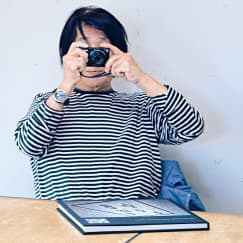
Hello, Daido
Interview with Daido Moriyama -
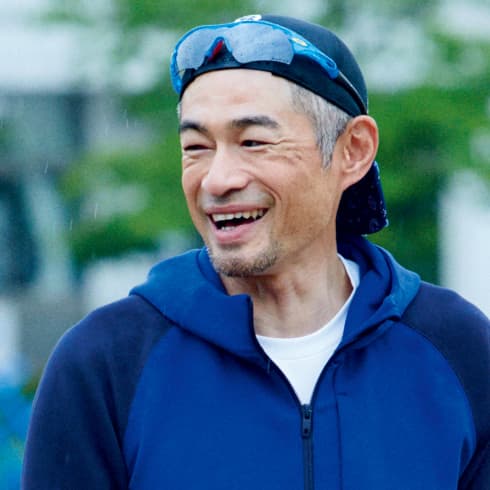
Hello, Ichiro
Interview with Ichiro Suzuki -
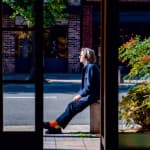
Hearing Rivers, Feeling Mountains
Nigel Peake in Kyoto -

Hello, Mame
Interview with Maiko Kurogouchi -

Hello, Sofia
Interview with Sofia Coppola -
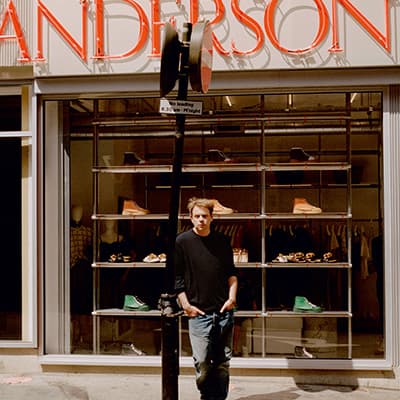
Hello, Jonathan
Interview with Jonathan Anderson -
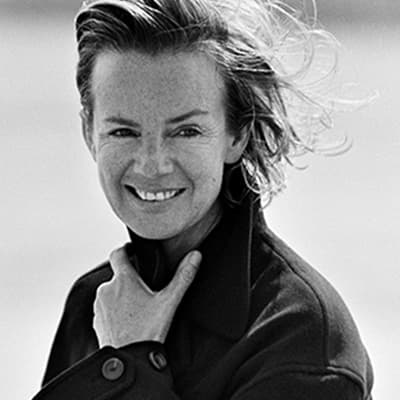
Hello, Jil
21 Questions with designer Jil Sander -

Hello, Ayumu
20 Questions with Ayumu Hirano -

Hello, Roger
30 Questions with Roger

























